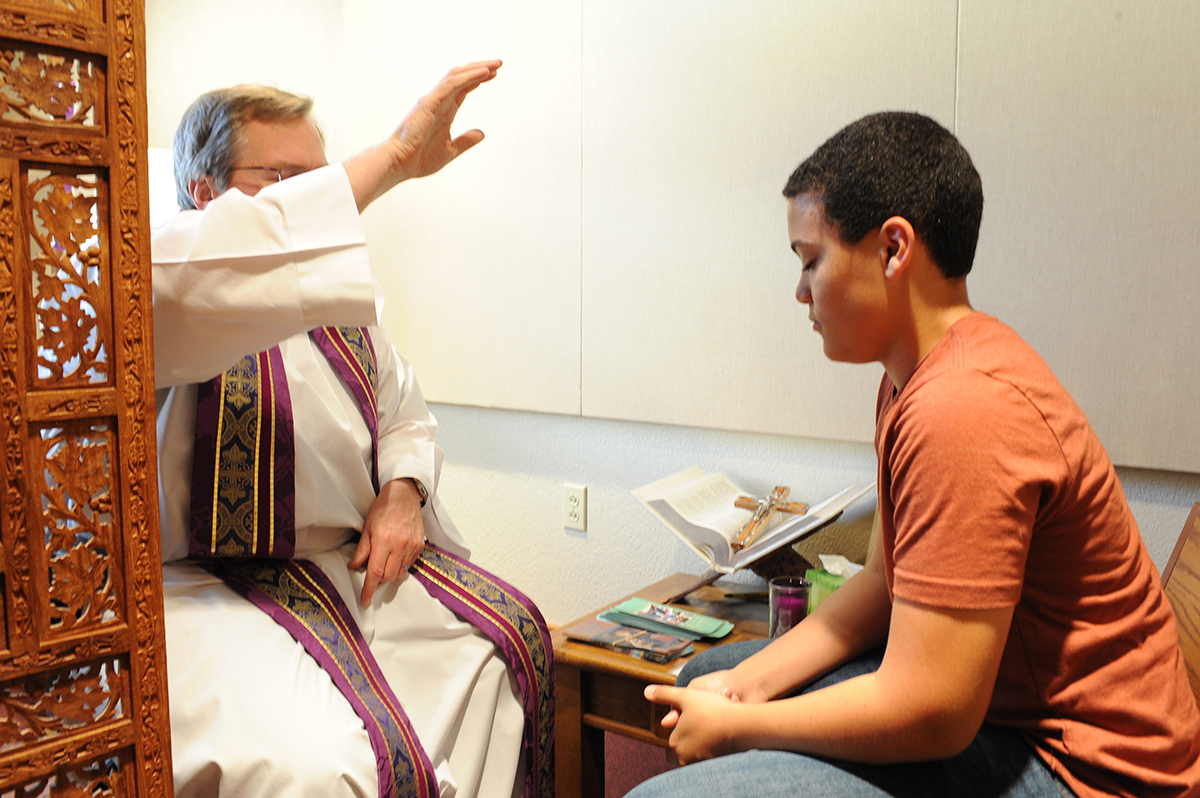Quick—what words come to mind when you think of going to Confession? How about conversion, healing, forgiveness, reconciliation, honesty, courage, or even celebration?
The Church uses all of those words to describe the sacrament of Penance and Reconciliation. It is one of the two sacraments of healing (the other being the Anointing of the Sick); it is sometimes called the sacrament of conversion, the sacrament of confession, or the sacrament of forgiveness. Pope John Paul II called it an act of honesty and courage. And the Catechism of the Catholic Church refers to it as a celebration eight times.
All of those descriptions belie the popular stereotype of the sacrament of Penance and Reconciliation as focusing primarily on guilt. In fact, many who attend the sacrament use another word to describe its effects: joy.
If you haven’t been to the sacrament of Penance and Reconciliation as a family, give it a try. Better yet, try making it a habit. Like any healthy practice (think of exercise or flossing), getting started might be a challenge, but if you stick with it, you’ll be pleasantly surprised by the results. Here are some tips:
► Identify obstacles. If your family doesn’t regularly participate in the sacrament of Reconciliation, think about why that is. Maybe you or other family members have objections to going (check out the list of common objections, below). Or maybe the reason is more practical. If so, read on for some strategies.
► Model reconciliation. Practice reconciliation at home. Show your children what it looks like by apologizing to your spouse (or other adults) for small transgressions. More powerfully, apologize to your children: “I wish I hadn’t done that to you; I’m sorry I did.” Keep it simple and straightforward, and show that admitting fault is not a sign of weakness, but strength.
► Coach reconciliation. Kids of all ages (and not a few adults) often have difficulty moving through a conflict to reconciliation. You can help them out by coaching them through it. Have them sit down in chairs and work through the conflict as much as they can themselves, providing help or advice as needed. (A five-minute silent cooling off period might help.) Teach them how to voice their grievances in a way that sticks to the facts and respects the other person’s dignity; teach them how to listen and respond constructively; and teach them how to apologize. These are difficult skills, even for adults; see below for links to helpful resources.
►Understand the sacrament. Many Catholics have misconceptions about the sacrament of Penance and Reconciliation. If you or your older children or teens haven’t learned anything new about the sacrament since the second grade, investigate a more mature understanding of the sacrament.
► Find a time that works. Find confession times at local parishes and go to the one that best fits your schedule; sometimes parishes even offer confession during weekdays. If you can’t find a time that works, schedule a special appointment with your pastor. He might even be willing to offer the sacrament before or after Sunday Mass.
► Develop a habit. Make regular confession a habit by scheduling it on your calendar and giving it the same priority as a dentist or car maintenance appointment. Start by committing to attend three times a year: once during Advent, once during Lent, and once over the summer. If you already go that often, make it a habit to go once a month.
► Young children? Go early. If you are attending confession with young children or babies, show up ten minutes early to be near the front of the line; if you are lucky, the priest may show up early, too.
► Help kids overcome nervousness. Kids are often nervous the first few times they participate in the sacrament of Penance and Reconciliation. Help them out by providing them with an Examination of Conscience. Provide them with a written Act of Contrition (the prayer that the penitent prays during the sacrament). Reassure them that the priest will help them out. And finally, attend with them; go first so they can see you emerge unscathed!
► Practice a Daily Examen. Incorporate the Daily Examen into your routine in the days leading up to the sacrament, as a way of raising your children’s awareness of where they need healing and forgiveness.
Talking points: Overcoming objections
Most Catholics do not participate in the sacrament of Penance and Reconciliation for one reason or another. Here are some common objections that might be raised by your kids, and some responses you might try out:
► I don’t know what to confess. If your kids don’t know what to confess, help them out by doing a Daily Examen for several days before confession; then, provide them with a printed Examination of Conscience.
► I haven’t done anything bad enough to confess. Encourage kids—especially older children and teens—to think not only about what they did wrong, but how they have fallen short of being the person God made them to be. Even saints, priests, and religious sisters and brothers regularly celebrate the sacrament of Penance and Reconciliation, recognizing that the grace of the sacrament strengthens them to follow God’s will more perfectly, and so become more truly themselves. Comparing the person we have been to the saint we would like to be opens up all sorts of possibilities for confession.
► Confession is all about guilt and shame; I believe in a loving God. The reality of God’s unconditional love lies at the heart of the sacrament, which recalls the parable of the Prodigal Son (Catechism #1439, 1465). Because God loves us, he wants to heal us of whatever hurts us—most especially sin. We don’t go to confession in order to focus on what bad people we are; we go to confession because ignoring our sins doesn’t make them go away. Just as we bring our physical injuries to the doctor for healing, we go to confession to be healed of our sins (Catechism #1456).
► I am too embarrassed or ashamed. It is natural for children to feel shy about confessing their sins in front of a priest. Simple repetition is the best remedy to this issue, although depending on the child, it might help to get to know the priest better outside of confession—or to confess with a different priest at another parish. It might help to remind your child that, during the sacrament, the priest acts in the person of Christ; it is Jesus who hears and forgives our sins. Read stories of Jesus’ mercy toward sinners to reinforce the point. Finally, remind your child that anything she confesses must be kept secret by the priest (Catechism #1467).
► Why can’t I just ask God for forgiveness directly? Anyone can pray to God for forgiveness at any time, as King David did (see Psalm 51 for a beautiful song of repentance). However, God came to us in Jesus in order to forgive us “in the flesh,” and he continues to do so even today by making the whole Church the sign and instrument of his forgiveness. In the sacrament of Penance and Reconciliation, then, the priest, acting in the person of Christ, makes the tender mercy of God tangible. Moreover, Catholics confess their sins before a priest in recognition that their sins not only hurt their relationship with God, but one another, and especially the Church (Catechism #1441-1445).
Learn more:
► Catechism of the Catholic Church #1422-1498
► Examination of Conscience . . . A simple Examination of Conscience for children, plus links to additional Examinations of Conscience.
►Kids, Confession, and Coming Out of Hiding . . . A personal essay about helping kids overcome their fear of confession.
►Preparing for First Reconciliation When Your Child Has Special Needs
And finally, here’s a beautiful, fun whiteboard video on the sacrament of Confession for kids from the Video Catechism series by ODB Films:



